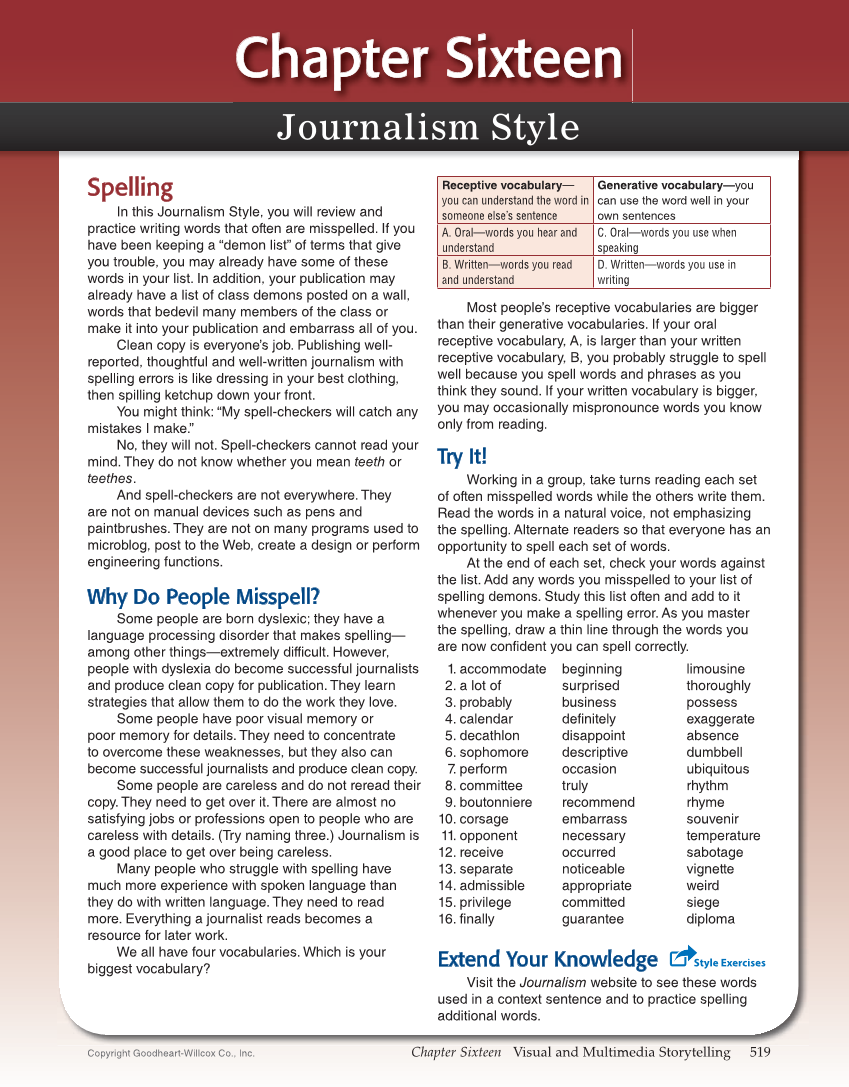Copyright Goodheart-Willcox Co., Inc. Chapter Sixteen Visual and Multimedia Storytelling 519 Chapter Sixteen Chapter Sixteen Journalism Style Spelling Spelling In this Journalism Style, you will review and practice writing words that often are misspelled. If you have been keeping a “demon list” of terms that give you trouble, you may already have some of these words in your list. In addition, your publication may already have a list of class demons posted on a wall, words that bedevil many members of the class or make it into your publication and embarrass all of you. Clean copy is everyone’s job. Publishing well- reported, thoughtful and well-written journalism with spelling errors is like dressing in your best clothing, then spilling ketchup down your front. You might think: “My spell-checkers will catch any mistakes I make.” No, they will not. Spell-checkers cannot read your mind. They do not know whether you mean teeth or teethes. And spell-checkers are not everywhere. They are not on manual devices such as pens and paintbrushes. They are not on many programs used to microblog, post to the Web, create a design or perform engineering functions. Why Do People Misspell? Why Do People Misspell? Some people are born dyslexic they have a language processing disorder that makes spelling— among other things—extremely difficult. However, people with dyslexia do become successful journalists and produce clean copy for publication. They learn strategies that allow them to do the work they love. Some people have poor visual memory or poor memory for details. They need to concentrate to overcome these weaknesses, but they also can become successful journalists and produce clean copy. Some people are careless and do not reread their copy. They need to get over it. There are almost no satisfying jobs or professions open to people who are careless with details. (Try naming three.) Journalism is a good place to get over being careless. Many people who struggle with spelling have much more experience with spoken language than they do with written language. They need to read more. Everything a journalist reads becomes a resource for later work. We all have four vocabularies. Which is your biggest vocabulary? Receptive vocabulary— you can understand the word in someone else’s sentence Generative vocabulary—you can use the word well in your own sentences A. Oral—words you hear and understand C. Oral—words you use when speaking B. Written—words you read and understand D. Written—words you use in writing Most people’s receptive vocabularies are bigger than their generative vocabularies. If your oral receptive vocabulary, A, is larger than your written receptive vocabulary, B, you probably struggle to spell well because you spell words and phrases as you think they sound. If your written vocabulary is bigger, you may occasionally mispronounce words you know only from reading. Try It! Try It! Working in a group, take turns reading each set of often misspelled words while the others write them. Read the words in a natural voice, not emphasizing the spelling. Alternate readers so that everyone has an opportunity to spell each set of words. At the end of each set, check your words against the list. Add any words you misspelled to your list of spelling demons. Study this list often and add to it whenever you make a spelling error. As you master the spelling, draw a thin line through the words you are now confident you can spell correctly. 1. accommodate 2. a lot of 3. probably 4. calendar 5. decathlon 6. sophomore 7. perform 8. committee 9. boutonniere 10. corsage 11. opponent 12. receive 13. separate 14. admissible 15. privilege 16. finally beginning surprised business definitely disappoint descriptive occasion truly recommend embarrass necessary occurred noticeable appropriate committed guarantee limousine thoroughly possess exaggerate absence dumbbell ubiquitous rhythm rhyme souvenir temperature sabotage vignette weird siege diploma Extend Your Knowledge Extend Your Knowledge Visit the Journalism website to see these words used in a context sentence and to practice spelling additional words. Style Exercises
